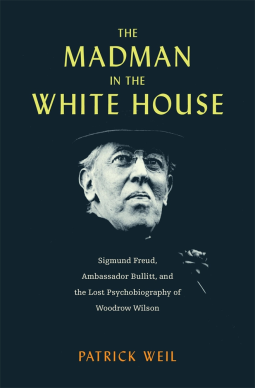
The Madman in the White House
Sigmund Freud, Ambassador Bullitt, and the Lost Psychobiography of Woodrow Wilson
by Patrick Weil
This title was previously available on NetGalley and is now archived.
Send NetGalley books directly to your Kindle or Kindle app
1
To read on a Kindle or Kindle app, please add kindle@netgalley.com as an approved email address to receive files in your Amazon account. Click here for step-by-step instructions.
2
Also find your Kindle email address within your Amazon account, and enter it here.
Pub Date May 16 2023 | Archive Date May 16 2023
Talking about this book? Use #TheMadmanintheWhiteHouse #NetGalley. More hashtag tips!
Description
“A rich study of the role of personal psychology in the shaping of the new global order after World War I. So long as so much political power is concentrated in one human mind, we are all at the mercy of the next madman in the White House.”
—Gary J. Bass, author of The Blood Telegram
The notorious psychobiography of Woodrow Wilson, rediscovered nearly a century after it was written by Sigmund Freud and US diplomat William C. Bullitt, sheds new light on how the mental health of a controversial American president shaped world events.
When the fate of millions rests on the decisions of a mentally compromised leader, what can one person do? Disillusioned by President Woodrow Wilson’s destructive and irrational handling of the 1919 Treaty of Versailles, a US diplomat named William C. Bullitt asked this very question. With the help of his friend Sigmund Freud, Bullitt set out to write a psychological analysis of the president. He gathered material from personal archives and interviewed members of Wilson’s inner circle. In The Madman in the White House, Patrick Weil resurrects this forgotten portrait of a troubled president.
After two years of collaboration, Bullitt and Freud signed off on a manuscript in April 1932. But the book was not published until 1966, nearly thirty years after Freud’s death and only months before Bullitt’s. The published edition was heavily redacted, and by the time it was released, the mystique of psychoanalysis had waned in popular culture and Wilson’s legacy was unassailable. The psychological study was panned by critics, and Freud’s descendants denied his involvement in the project.
For nearly a century, the mysterious, original Bullitt and Freud manuscript remained hidden from the public. Then in 2014, while browsing the archives of Yale University, Weil happened upon the text. Based on his reading of the 1932 manuscript, Weil examines the significance of Bullitt and Freud’s findings and offers a major reassessment of the notorious psychobiography. The result is a powerful warning about the influence a single unbalanced personality can have on the course of history.
Patrick Weil is Oscar M. Ruebhausen Distinguished Fellow at Yale Law School and a research professor at the National Center for Scientific Research in France. The founder and president of Libraries Without Borders, he is the author of The Sovereign Citizen and How to Be French.
Advance Praise
“A remarkable and valuable contribution which merits applause. There is unlikely to be another account to rival it. Weil has explored with great thoroughness—and detachment—the story of the enigma surrounding Woodrow Wilson and the fascinating events of 1919 which continue to remain such.”—Antony Lentin, Wolfson College, University of Cambridge
“Patrick Weil has given us a vivid group portrait of Sigmund Freud, William Bullitt, and Woodrow Wilson—actors in and witnesses to the great drama of the Treaty of Versailles. Based on newly unearthed archival evidence that sheds light on how Freud and Bullitt wrote a biography of the twenty-eighth president of the United States, this is an urgent reappraisal of critical events of twentieth-century history.”—Élisabeth Roudinesco, author of Freud: In His Time and Ours
“A generation ago diplomats could be real shapers of foreign policy, and not just the president’s messengers. William C. Bullitt was among the most influential of them. He served in the American delegation at the Paris Peace Conference of 1919, and he represented the United States as ambassador in Moscow and in Paris as World War II approached. He was close to both Woodrow Wilson and Franklin D. Roosevelt. Along the way he met Sigmund Freud and collaborated with Freud in a controversial analysis of Wilson’s character. Patrick Weil uses Bullitt’s career to probe the significance of personality in American presidential decision-making. This unusual book enriches and completes a story that we may have thought we knew well.”—Robert O. Paxton, author of The Anatomy of Fascism
Available Editions
| EDITION | Hardcover |
| ISBN | 9780674291614 |
| PRICE | $35.00 (USD) |
| PAGES | 400 |



